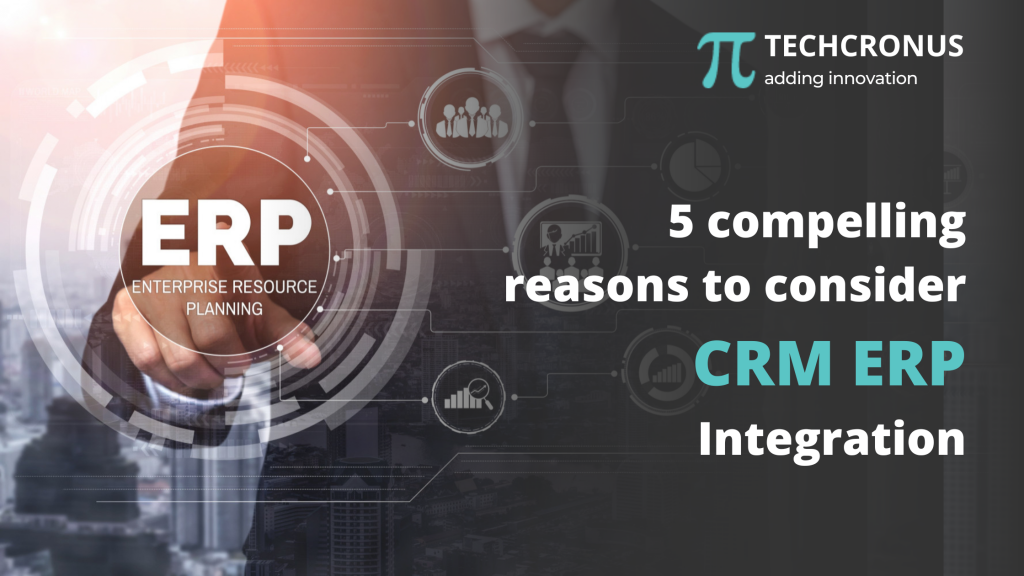5 Compelling Reasons to Consider CRM – ERP Integration
CRM and ERP are two of the most ubiquitous tools in every modern company. On a big picture scale, both help streamline operations, improve customer interactions, and drive performance. 88% of companies have reported a higher success rate after the implementation of ERP software. Dynamic Consultants Group reports that the ROI per dollar spent on CRM software was $30.48 in 2021.
While each tool has its strong points, integrating both presents bigger opportunities for a business. Let us look at what CRM and ERP are, how they differ, and how their integration benefits your organization.
CRM & ERP: What are the Differences?
Before we venture out to find the differences between a CRM and an ERP, let us see what these tools are.
Customer Relationship Management (CRM) is a tool that is used to manage a company’s relationships and interactions with customers and potential leads. It has functions that are used for contact management, sales management, productivity and more. It is used to improve business relationships and lets the company maintain a connection to customers, streamline processes and improve profitability.
Enterprise Resource Planning (ERP) is software that is used to manage day-to-day activities in an organization. These include accounting, project management, procurement, risk management and compliance and supply chain operations. A well-built ERP software brings together multiple business processes and enables data flow between them.
The major difference between ERP and CRM are:
ERP – is meant for the finance and operations departments
CRM – is meant for customer service departments
ERP – referred to as back office application
CRM – referred to as front office application
ERP – systems may include CRM component
CRM – system does not have an ERP component
Five Advantages of Integrating CRM with ERP System
The prowess of a CRM and ERP when brought together can give a significant advantage to a company. Here is how your company can benefit from bringing the finance & operations management and customer management departments together.
1. Create Better Customer Engagement
An integrated CRM and ERP means that you can simultaneously view both the front end and back end of your business. With better insights into how your business is performing, you can strategize a better customer engagement technique. By enabling personalisation, and cross-selling and upselling techniques, you can improve your business prospects.
2. Avoid Data Silos
Both a CRM and ERP manage data about the customer. However, if they are separate, they need to be duplicated to reflect in the other software. However, with an integrated CRM and ERP, you can use the data that is merged to derive insights that benefit the business.
3. Improve Efficiency
As individual tools CRM and ERP improve the efficiency of a business. However, when they operate independently of each other it creates silos that bring down a business’s potential to improve. An integrated CRM and ERP system ensures that a lot of the tasks are automated with artificial intelligence. With more work hours freed up, it can be used to improve crucial business factors.
4. Grow Business Opportunities
With an integrated ERP and CRM, there is a full-rounded view of the various aspects of the business. With technology like AI and BI powering business software, there is better data utilization. Powered by data, you can serve your customer better. There is the scope for personalization and increased loyalty from the customer. The data from these tools can also be used to cross-sell or up-sell products. Leveraging technology like machine learning and predictive analysis, the sales team can make more informed decisions and achieve successful sales outcomes.
5. Empower Your Employees
An integrated CRM and ERP system is a powerhouse of information. From entire customer history to real-time business information available at a click, employees can utilize this information to create better customer satisfaction. With better business prospects, this scenario also builds the employee’s productivity and increases confidence in the brand.
The Last Words
Every business needs to adapt to the changing technological scenario to stay afloat in the fierce competition. There are various providers for enterprise business application services. While some provide ERP and some provide CRM, it takes an experienced firm to develop and implement the integrated ERP and CRM software for you.
If you are looking for business application services in Australia, then look no further than Techcronus Australia. Techcronus is a leading name in providing enterprise business solutions for Microsoft Dynamics ERP and CRM. Reach out to us today to discuss how we can implement an integrated CRM and ERP for your business.
